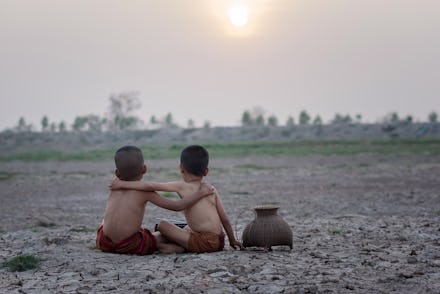Good work everyone: Climate change will harm kids most of all

If you needed another reason to put forth all the effort you possibly could toward reducing the effects of climate change, one may very well have just surfaced. When it comes to the health impact of the climate change, there's one particular group that will end up suffering more than others: children. According to a new report by way of medical journal The Lancet, which compared the consequences of human health between scenarios where the world is or isn't able to reduce global temperature, children would end up being one of the largest groups to suffer ill effects brought on by the various environmental changes and factors. It's a depressing thought, but perhaps one that may be the wake-up call some individuals need to be spurred into action.
The report underlines the fact that failing to do anything about the continued environmental issues we face on a daily basis would inevitably lead to health problems brought on by air pollution, malnutrition, and rising temperatures as well as a host of infectious diseases.
Alarmingly, on a global scale, if a child is born today, they will live until 2090 on average, according to Dr. Nick Watts, the executive editor of the report in The Lancet. But that number could very swiftly begin to go down if nothing changes about the way we're treating the environment.
"With every degree of warming, a child born today faces a future where their health and well-being will be increasingly impacted by the realities and dangers of a warmer world,” said lead author of the United States policy brief attached to the report and Harvard instructor Dr. Renee N. Salas. For children who haven't even entered the world just yet, the damage is already being done.
"Climate change, and the air pollution from fossil fuels that are driving it, threatens the child’s health starting in the mother’s womb and only accumulates from there," explained Dr. Salas. Plus, due to the way children's bodies form as they get older, they're even more at risk. Their faster breathing and heart rates make for troublesome ways pollution can affect them more directly, as they simply absorb more air pollution in relation to the size of their bodies than adults, according to Dr. Mona Sarfaty, director of climate and health at George Mason University.
The detrimental effects on children's health by way of pollution aren't just supposition, either. Dr. Sarfaty pointed to research in The New England Journal of Medicine that showed that children who grew up before our air quality got so bad "literally had more functioning lung tissue."
With kids spending more of their life outside than adults playing and getting exercise in addition to being more susceptible overall to pollution, they're more at risk than you might have previously guessed. But it's not just pollution they need to be concerned with: wildfires are a massive threat as well. Rising temperatures bring more frequent fires with them, and as such, children will inevitably have to deal with these natural threats in the future as well.
"You have young kids escaping fires that are going to be, in effect, challenged for life," Gina McCarthy, former administrator for the Environmental Protection Agency, explained. "There are mental health issues happening as a result of these climate events and fires and floods that children have never had to face, certainly not to the frequency and intensity that they have to face now."
So what's the answer? Swift, or immediate action, taken to start drastically reducing emissions, global warming, and the other negative impact our actions are having on the planet. If we wait too much longer, it won't be the older crowd that suffers so much as future generations — and does anyone really want that on their conscience?